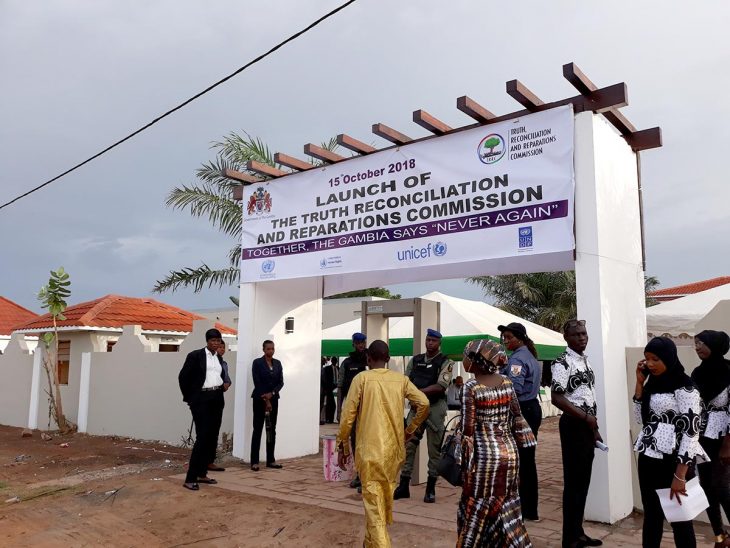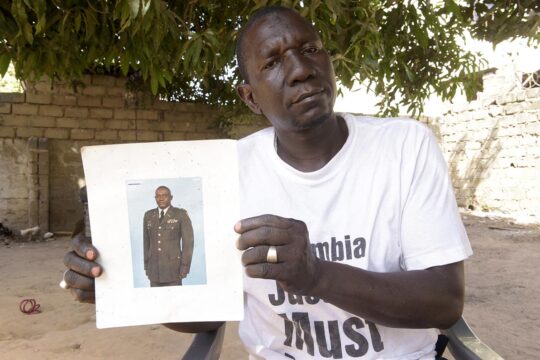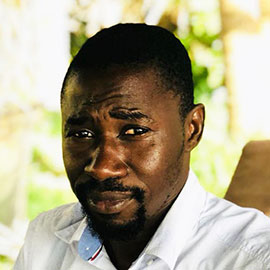It has been one year since the Truth, Reconciliation and Reparations Commission (TRRC) opened its public hearings, on January 7, 2019. And it would be hard to choose which of the many spectacular events that have punctuated the ten three-week sessions over the past year should be most remembered. From the testimonies of victims of torture and rape to the stunning confessions of perpetrators – among them most of the senior members of the former military junta that ruled the country from 1994 to 2017 – the TRRC has stood out as the event of the year in the field of transitional justice.
As the Commission prepares to begin its second year of public hearings on January 20, a total of 188 witnesses have appeared so far, including 51 women. Twenty-three of the victims who testified were Gambians living abroad who were heard through live video link. Two protected witnesses testified in closed session. And a total of 35 alleged perpetrators provided a remarkable amount of information previously unknown on serious human rights violations committed during the 22-year rule of Yahya Jammeh.
“The evidence that has come out of witness testimonies since January 7, 2019 shows that there were widespread human rights violations in The Gambia under the Jammeh regime. From both victims and perpetrators, we have learnt of arbitrary arrests, detentions, horrible prison conditions, tortures, killings, sexual abuses, and the incomprehensible practice of accusing innocent people of witch craft, subjecting them to cruel, inhumane and degrading treatment, forcing them to drink health-destroying concoctions, and subjecting them and their families to a life of stigma and public ridicule,” said Dr Baba Galleh Jallow, the executive secretary of the TRRC, at a press conference last December. “The extent of the human rights violations that occurred in this country defy comprehension and, we are confident, has cemented a determination in Gambians to never again allow their rights and dignities to be trampled with impunity by the state.”
Solving decades-old mysteries
Among the important historical events covered by last year’s hearings were the circumstances surrounding the July 22, 1994 military coup that brought Jammeh to power; the following execution of about a dozen soldiers; the killings of West African migrants in 2005; the murder of journalist Deyda Hydara in 2004 and of former Finance minister Ousman Koro Ceesay in 2005; the crackdown on the media and journalists; the activities of the Junglers, a hit-squad; cases of sexual and gender-based violence against women, including by former president Jammeh himself; the killing of students in the April 2000 demonstrations; arbitrary arrests, detentions and tortures; and the 2009 Jammeh-led witch-hunt in which hundreds of people were forced to drink dangerous or lethal concoctions.
According to a 2018 survey by Afrobarometer, a pan-African research network, 34% of the population expected the TRRC to deliver national peace, reconciliation, forgiveness and healing. About 30% believed it should create an accurate record of human rights abuses of the past regime and 28% believed that it will prosecute and punish persons found guilty of crimes against humanity. This showed the diversity of people’s expectations in a country where, according to the same survey, 28% reported that they or a member of their family had suffered one form of human rights violations under Jammeh’s rule.
A leading participant in this research was Sait Matty Jaw, a lecturer at the University of the Gambia. Jaw thinks that in its first year of public hearings the Commission has done well in exposing past crimes. “I have lived in this country all my life and some of these atrocities were just stories – until they were being exposed before the TRRC,” he said.
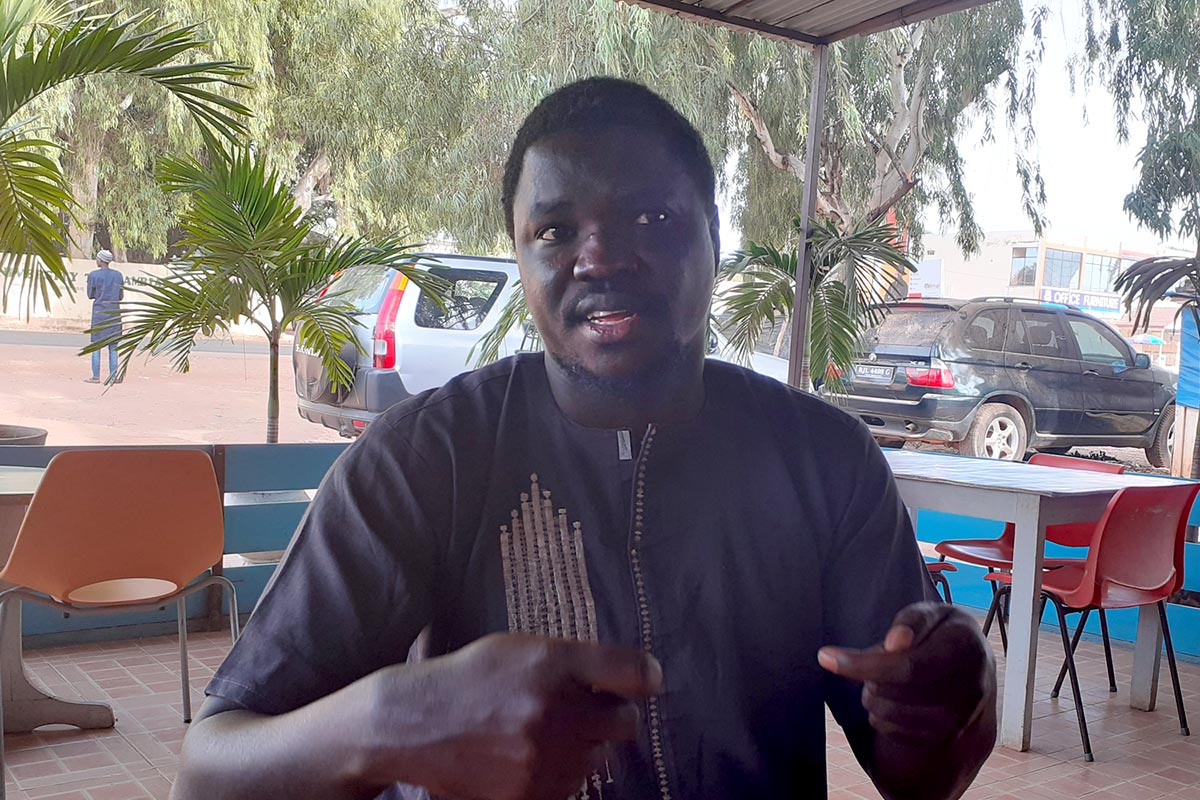
Low female participation
The Commission has so far registered 941 victims, an overwhelming majority of them were male. “The Commission has had to grapple with many challenges, including the difficulty of convincing some witnesses, especially female victims, to come forward and give statements or testify,” admitted Dr Jallow. “The TRRC is also having to deal with the challenge of female witness shaming and threatening. Some women who have publicly testified before the Commission have been objects of ridicule, insults and even threats from some members of the public. This unfortunate situation has the effect of discouraging all but the most courageous female victims from coming forward and sharing their stories with the Gambian public or even submitting statements to the Commission.”
Nyima Camara, a researcher and lecturer at the University of the Gambia, thinks the patriarchal nature of the Gambian society has everything to do with it. “Unfortunately, in our society, they are sensitive matters that we do not discuss or talk about often. Women understand, as it is rooted in the structures of our patriarchal traditions and ‘values’, that disclosing their abuse is being made a taboo and so when it happens, it is the victim rather than the perpetrator that gets vilified and condemned,” she said.
Officially, the Commission has a witness protection mechanism in place. And it is a crime to threaten or interfere with a TRRC witness. “Women need to be encouraged further to come forward openly about their abuse and understand that the shame is not theirs but the perpetrators’. Their strength is what is required to break through the barriers and change the current status quo and narrative,” added Camara.
In December 2019, a number of women leaders came together to compile a report on women experiences under the dictatorship and submit it to the Commission. This followed the Commission’s hearing on sexual violence in October. The report presented stories and viewpoints of women who are not comfortable giving public testimony because of numerous risk factors. These women stress that these voices are too important in understanding the dictatorship for them to be ignored.
The release of the Junglers
Didier Gbery, Gambia’s representative for the International Center for Transitional Justice, noted that in other countries truth commissions collect statements, conduct wider public outreach and then start public hearings. In the Gambia, however, the TRRC collects statements as it conducts hearings. As a result it has often looked like a live investigation. Gbery thinks that the most efficient method may have been to organize statement-taking first and then public hearings. A counterargument, though, is that it is precisely this live process that has made Gambia’s Truth Commission such a national happening. Throughout the year, the TRRC has maintained keen public interest.
One of the most controversial issues the TRRC had to face was the release of four confessed killers from state custody last July. Prior to their release, these four Junglers had confessed to dozens of killings on the orders of Jammeh. The decision to release them did not sit well with victims. On a visit to the Gambia last November, Fabián Salvioli, the United Nations Special Rapporteur on the promotion of truth, justice, reparation and guarantees of non-recurrence, stated that “the release of Junglers after confessing of gross human rights violations before the TRRC shocked Gambian society and has eroded people’s trust in the TRRC process and in the government’s will to conduct an effective transitional justice.” Salvioli said the release represented a form of re-victimisation. “Over the course of my visit, virtually every person with whom I met has strongly criticised and expressed concern about this decision,” he added.
From the onset, however, the TRRC attempted to shake this off its back: the release was not their decision, as Dr Jallow repeated in a press conference last month. It was instead the decision of the Justice Minister Aboubacarr Tambadou. Tambadou argued that he could not hold them forever in jail without charge. He has long cried about the lack of capacity of his ministry to handle several cases. “The problem with the release of the Junglers is the lack of public understanding of the basis of the Minister’s decision. Nothing was done to prepare the public ahead,” said Didier Gbery. Amidst controversy, Tambadou sought to clarify that the Junglers’ release was not necessarily an amnesty.
Managing people’s expectations
Other decisions taken by the TRRC or the Justice Ministry have divided the Commission’s followers and observers. In the most recent one, on October 23, the TRRC held a reconciliation meeting between Sanna Sabally and Edward Singhatey, two key players in the 1994 military coup, who both testified before the Commission. The two men have allegedly committed serious crimes, including killings, for which they took full or partial responsibility during their public testimonies. Singhatey was seen by many as not being truthful during his hearing. While he seemed largely linked to the killing of former Finance minister Ousman Koro Ceesay he denied any involvement.
Many people thought the Commission should not facilitate what they consider a charade between two perpetrators posing as victims. The Commission’s chair Dr Lamin Sise said they did not stage the reconciliation meeting. It was requested by Sabally and Singhatey and, based on its mandate, the TRRC was required to facilitate it.
Sait Jaw observed that there was inadequate sensitization on how voluntary truth-telling works within the context of truth commissions. After people are accused before the Commission, there is often already someone calling for their heads. “I think they need to constantly talk to the people on what the mandate of the TRRC is, their procedures and others’. This is important. The truth commission process is very new to us,” he said.
According to Jaw, the occasional public outburst has to do with the suspicion people have developed about the government’s commitment to resolving past atrocities. But he said the Justice Ministry should stick to the concept of voluntary truth and wait for the Commission’s findings when its work is completed in December 2020. “If you want to establish the truth, you cannot just hear one story or the other; you need to hear from every side. If someone comes and you want to determine that they are lying, what will that be based on?” said Jaw.
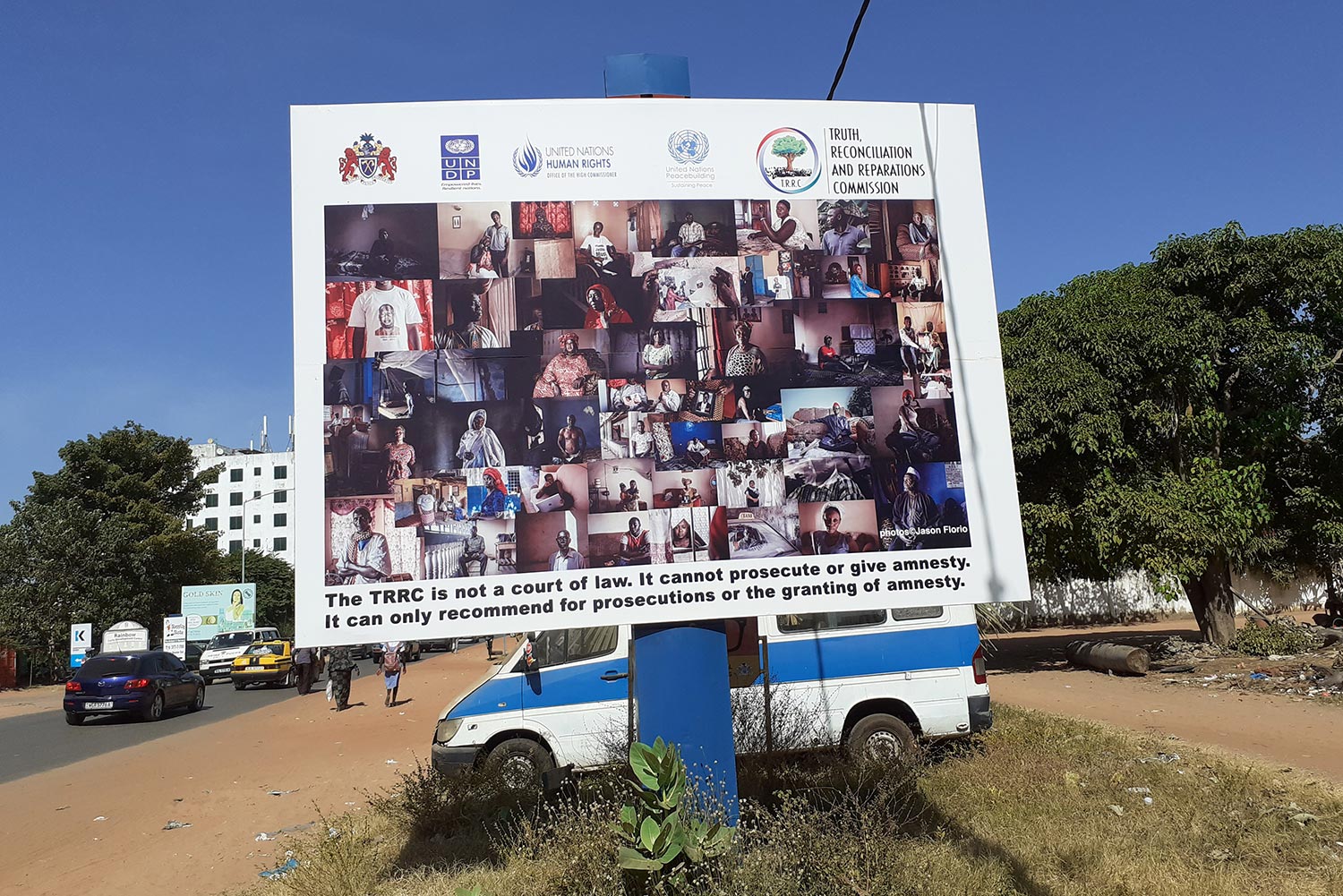
Gambia’s truth commission is trying to make its role clearer to the population. © Mustapha K. Darboe
Big needs, limited funds
Two other things are at the heart of the TRRC’s work: amnesties and reparations. Didier Gbery says the Commission needs to intensify its work to ensure that people know what is reparation and who qualifies for it as well as what is amnesty and who qualifies for it.
The operational budget of Gambia’s TRRC is 130 million dalasis (about 2,3 million euros), a significant amount of money for a poor little country. A large part of this funding comes from partners such as the United Nations, the European Union and Qatar. The TRRC has also been given powers to grant its own reparations without consulting any authority. Aside from its regular budget, it can issue interim reparations as it holds its public sessions. The Commission has already been facing such interim reparations needs while its reparations policy is still being finalized. For instance, during its last session which focused on witch-hunting, several witnesses have complained of ill-health as a result of drinking the so-called witch doctors’ concoctions. The Commission contributed to the treatment of four victims in December. It also played a part in sending four other people for treatment in Turkey and pay for their stay. “While the Gambia government has contributed 50 million dalasis [about 880 000 euros] to the TRRC’s reparations fund, this is far from enough to cover the Commission’s reparations obligations,” said Dr Jallow. “It is anticipated that more victims will benefit from both local and overseas medical treatment in the coming year.”
The pros and cons of tough questioning
The TRRC main public face has been its lead legal counsel Essa Faal, a criminal lawyer with strong experience at international tribunals. He has become something like a reality TV star in the country. His prosecutorial style, however, has been criticized by some. Faal has defended his tough questioning method as necessary to extract the truth out of people who had served the regime. But according to Sait Jaw, Faal’s strategy focuses more on criminal culpability than truth-telling. As a result, he said, important facts and context may sometimes be missed. “Focusing on criminal culpability will only help us get one individual but it will not help us get to know what went wrong, where it went wrong, among other things,” Jaw argued. “When the former vice-president [Isatou Njie Saidy] came [to testify], the focus was on her role in the student killings. Sometimes, we need to understand how institutions were operating and so far, I have not seen that,” he said. “I would like to see the commissioners play a leading role. The public knows the lead counsel more than they know the chairman,” Jaw noted. “The danger is that the lead counsel becomes the TRRC when the power of the Commission is the commissioners.”
A related criticism is that the Commission – and its lead counsel – is generating much hype around the appearance of perpetrators rather than that of victims, when “the TRRC needs to be a victim-centered” process, said Jaw.
Yet, several victims were happy to see the lead counsel going for the throat of alleged perpetrators. “It is important to make sure that what the perpetrator said is the truth. The purpose of the Commission is to expose the truth. So, if the evidence is strong, [Faal] has no choice but ask tough questions,” said Didier Gbery.
The changing political landscape
Late December, the European Union delegation to the Gambia has issued a statement expressing concern over attacks on the Truth Commission from political figures and individuals in the country. The EU said the threatening remarks against the Commission have the potential to hamper the healing and reconciliation process in the country. The statement did not mention any names. However, it came after the leadership of the Alliance for Patriotic Reorientation and Construction (APRC), the party of former president Yahya Jammeh, launched attacks on the Commission at their rally in Abuko on November 23. And many worried that Gambia’s government said nothing about those attacks.
The Truth Commission was an idea of the seven-party coalition that backed Adama Barrow to the presidency. This coalition has now disintegrated and Barrow has formed his own political party, seeking a new political constituency. Many of his critics said the country’s president has been softening his position on Jammeh as a way of attracting the former ruler’s support base.
Barrow has dismissed claims that he was contemplating forming an alliance with the APRC. However, Sait Jaw and others believe politics could affect the Commission. “This is a project that was started by a group of people. Now, who is championing it? The other aspect is seeing the APRC constantly and continuously criticizing the process as a witch-hunt against Jammeh,” explained Jaw. “Those two elements are very important because at the end of the day, we expect that the TRRC’s report will be implemented by political authorities.”
So far the government has in many instances shown strong commitment in defending the TRRC. But Sait Jaw believes that with the changing political environment, there are already signs that the goodwill could wane.


